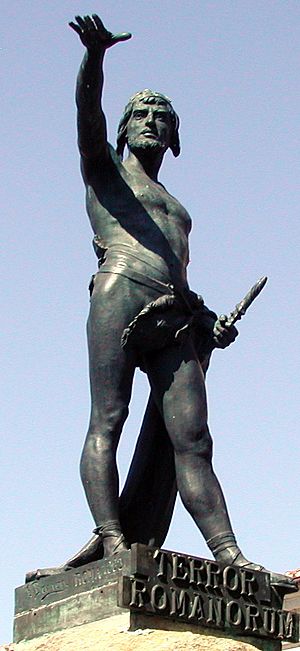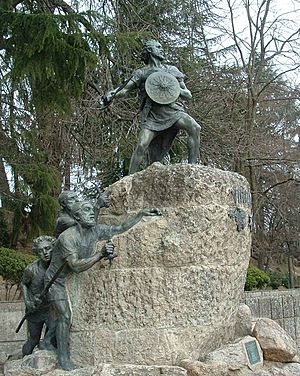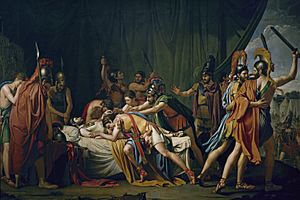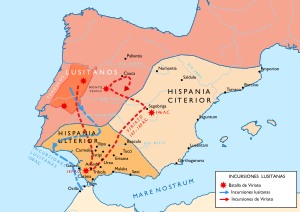Viriathus facts for kids
Quick facts for kids
Viriathus
|
|
|---|---|

|
|
| Native name |
Viriato, Viriatus
|
| Born | Lusitania |
| Died | 139 BC |
| Allegiance | Lusitania |
| Years of service | 147 BC – 139 BC |
| Battles/wars | Lusitanian War |
| Memorials | Statue of Viriato, at Zamora, Spain Statue of Viriato, at Viseu, Portugal |
Viriathus (also known as Viriato; died 139 BC) was a very important leader of the Lusitanian people. He led their fight against the powerful Roman army. The Romans were trying to expand their control into western Hispania, which is now parts of Portugal and Spain.
Viriathus formed alliances with other groups, even those far away. He convinced them to join his rebellion against Rome. He led his army, which included most Lusitanian and Vetton tribes, to many victories. These wins happened between 147 BC and 139 BC. Sadly, he was later betrayed and killed while he slept. The famous historian Theodor Mommsen once said that Viriathus seemed like a hero from ancient stories, like those in Homer's epics.
Contents
Who Was Viriathus?

Not much is known about Viriathus's early life. A Greek historian named Diodorus Siculus said he came from Lusitanian tribes near the ocean.
Viriathus was part of the warrior class, which was a small but powerful group. The Romans called him the dux (leader) of the Lusitanian army. They also called him the adsertor (protector) of Hispania. Sometimes, he was even called an imperator (commander), likely of the combined Lusitanian and Celtiberian tribes.
The Roman writer Livy described Viriathus as a shepherd who became a hunter, then a soldier. This was a common path for young warriors, known as the iuventus. They often spent their time raiding cattle, hunting, and fighting wars.
According to another historian, Appian, Viriathus was one of the few who escaped a terrible event. In 150 BC, a Roman governor named Galba massacred many young Lusitanian warriors.
Two years after this massacre, in 148 BC, Viriathus became the main leader of the Lusitanian army.
What Was Viriathus Like?
Some people thought Viriathus came from a very humble background. However, Diodorus Siculus also said that Viriathus "proved himself to be a prince." He even claimed to be "lord and owner of all." The Romans didn't know his family, but they were familiar with the native warrior families.
Many writers described Viriathus's strong personality and amazing skills. He was very strong and likely in the prime of his life. He was also an excellent planner and had a brilliant mind. Some ancient writers even described him with the exact features of a Celtic king.
Viriathus was known for being honest and fair. He always kept his word when making treaties and alliances. Livy called him a vir duxque magnus, meaning a "great man and leader." This title showed he had the qualities of ancient heroes.
Some modern historians believe Viriathus belonged to an important Lusitanian family that owned cattle. For the Roman historian Cassius Dio, Viriathus didn't fight for power or money. He fought for military glory. This goal was similar to what Roman noblemen valued at that time: serving and gaining honor in battle. Viriathus did not fight for war treasures, unlike common soldiers.
The Lusitanians honored Viriathus as their Benefactor (euergetes) and Savior (soter). These were special titles often used for kings.
Some people think he was from the Herminius Mons (Serra da Estrela) mountains in central Portugal. This area was the heart of Lusitania.
Much of his life and his war against the Romans are now part of legend. Viriathus is seen as one of the earliest national heroes of Portugal. He led the combined tribes of Iberia against Rome. The historian Appianus of Alexandria wrote that Viriathus "killed numerous Romans and showed great skill."
How Did Rome Conquer Lusitania?
In the 3rd century BC, Rome began to conquer the Iberian Peninsula. This started during the Second Punic War. The Roman Senate sent an army to Iberia to stop Carthaginian help from reaching Hannibal in Italy. This led to 250 years of fighting across Iberia. Rome finally conquered the region in 19 BC. The Lusitanian War is one of the most famous parts of this conquest.
Rome faced a lot of resistance in Iberia. In 197 BC, Rome divided the southeastern coast into two provinces: Hispania Citerior and Hispania Ulterior. Two elected praetors were put in charge of the legions. Like many other tribes, the Lusitanians lived in fortified villages called castros or citanias. They were usually allowed to remain autonomous through treaties, but they had to pay taxes.
Ancient writers praised Lusitania's rich land. Polybius wrote that because of the good climate, "both men and animals are very prolific, and the land is constantly productive."
What Were the Roman Taxes Like?
The Romans made the local tribes pay heavy taxes. These included a land-tax called vectigal and a certain amount of grain. Taxes were not the only way Rome made money. They also gained wealth from mining, peace treaties, and selling war prisoners as slaves. Local towns had to give their treasures to the Romans. This left them with only their yearly earnings to pay taxes. In 174 BC, Cato even defended the tribes' interests when a Roman official was accused of paying too little for the grain. The unfair treatment became so bad that Rome had to create special courts and laws, like the Lex Calpurnia in 149 BC.
Why Did the Lusitanians Revolt?
The Lusitanians first revolted against the Romans in 194 BC. Iberia was divided between tribes that supported Rome and those that rebelled. This was similar to how they had been divided between supporting Carthage or Rome before.
During this time, many treaties were broken. Roman generals or the Senate would not approve them, or the local people would break them.
In 152 BC, the Lusitanians made a peace deal with Marcus Atilius. He had conquered Oxthracae, their biggest city. Under Roman law, people who surrendered after fighting Rome were called peregrini dediticii. The terms of the deal were so bad that as soon as Atilius left, the Lusitanians rebelled again. They attacked tribes that had helped the Romans and plundered Lusitanian towns.
In 151 BC, the Celtiberians, who were Roman allies, feared revenge from the rebels. They asked the Romans to punish the rebellious tribes and keep their legions in Iberia for protection.
The Terrible Massacre of the Lusitanians
Around 150 BC, Servius Sulpicius Galba was the Roman commander in Hispania Ulterior. At the same time, Lucius Licinius Lucullus was governor of Hispania Citerior. In 151 BC, Lucullus, who was "greedy for fame and needing money," made a peace treaty with the Caucaei tribe. After the treaty, he ordered his soldiers to kill all the adult males. It is said only a few out of 30,000 escaped.
Galba joined forces with Lucullus, and they began to attack Lusitania. Lucullus attacked from the east, and Galba attacked from the south. The Lusitanian troops suffered many losses fighting on two fronts. Fearing a long siege and the destruction of their towns, the Lusitanians sent a group to Galba to ask for peace. For the Romans, this was seen as a surrender. The Lusitanians hoped to renew an older treaty. Galba received them kindly and agreed to a peace treaty on his terms. He told them to leave their homes and stay in open country. The Lusitanians likely lost their city and possessions, and their land would become Roman public land. When Romans conquered a territory, they usually took ownership of the land and everything on it.
The treaty turned out to be a trap, just like the one Lucullus had set. The unarmed Lusitanians, including Viriathus, gathered as Galba had ordered. They were supposed to hand over their weapons and be split into three groups to be given new lands. But then, the trap was sprung. Galba's army surrounded them with a ditch to stop them from escaping. Roman soldiers then entered and began to kill all the men of military age. The survivors were reportedly sold as slaves in Gaul.
Moving an entire tribe and killing or enslaving them was a common punishment for native groups who rebelled.
Galba gave some of the stolen goods to his army and his Roman-allied tribes. He kept the rest for himself. This terrible act caused a huge rebellion. The entire Lusitanian tribe gathered and fought Rome for three years, but they faced many defeats.
Three years after the massacre, the rebellion was almost defeated. That's when Viriathus appeared and offered to lead them. He understood Roman military methods. He saved the rebel Lusitanians with a simple but clever escape plan. Viriathus became their leader and caused much trouble for the Romans, seeking revenge for his people's massacre.
The "War of Fire" Begins
He carried on the war not for the sake of personal gain or power nor through anger, but for the sake of warlike deeds in themselves; hence he was accounted at once a lover of war and a master of war. ~ Cassius Dio
The war with Viriathus was called the "War of Fire" by the Greek historian Polybius of Megalopolis. Viriathus fought two types of war. He used a regular army for bellum (war). He also used latrocinium, which involved small groups and guerrilla tactics. Many writers see Viriathus as the perfect example of a guerrilla fighter.
Nothing is known about Viriathus until his first great act in 149 BC. He was with an army of ten thousand men that invaded southern Turdetania.
Rome sent the praetor Caius Vetilius to fight the rebellion. He attacked a group of Lusitanian warriors who were looking for food. After many were killed, the survivors hid in a place surrounded by the Roman army. They were about to make a new deal with the Romans. But Viriathus, who didn't trust the Romans, suggested an escape plan. His speech inspired the Lusitanians, and they made him their new commander.
His first action was to rescue the trapped Lusitanians. He lined them up as if to fight the Romans. Then, he ordered them to scatter and flee in different directions to meet later. Viriathus, with 1,000 chosen men, held back the 10,000 Roman soldiers. He kept them busy by being in a position to attack. Once the rest of the army had escaped, he and his thousand men also got away. By saving all the Lusitanian soldiers, he earned their strong loyalty.
Viriathus then planned an attack against Caius Vetilius in Tribola. Since the Romans had better weapons, he used guerrilla tactics and clever ambushes. Charging with iron spears, tridents, and loud roars, the Lusitanians defeated Vetilius. They killed 4,000 out of 10,000 Roman soldiers, including Vetilius himself. In response, the Romans hired Celtiberians to attack the Lusitanians, but they were also defeated. After this, the Lusitanians fought the armies of Gaius Plautius, Claudius Unimanus, and Gaius Negidius. All of them were defeated. During this time, Viriathus inspired the Numantine people and some Gauls to rebel against Roman rule.
To fully conquer Lusitania, Rome sent Quintus Fabius Maximus Aemilianus. He had 15,000 soldiers and 2,000 cavalry to help Gaius Laelius Sapiens. Aemilianus initially forced the Lusitanians to retreat. But he returned to Rome without defeating Viriathus. The Romans lost most of his reinforcements in Ossuma and Beja in Alentejo. This allowed the Lusitanians to access what is now Spanish territory, like modern Granada and Murcia. Viriathus's successes and the Numantine War caused many problems in Rome. One big problem was a drop in the number of new soldiers joining the legions.
Learning of these events, Rome sent one of its best generals, Quintus Fabius Maximus Servilianus, to Iberia. Near Sierra Morena, the Romans fell into a Lusitanian ambush. Viriathus did not harm the Romans. He let the soldiers and Servilianus go in exchange for a peace treaty. This treaty recognized Lusitanian control over the land they held. The Roman Senate approved this agreement. Viriathus was declared "amicus populi Romani," meaning an ally of the Roman people.
However, this peace treaty made Quintus Servilius Caepio unhappy. He became the successor to his brother, Servilianus, in command of the army in Iberia. He told the Roman Senate that the treaty was a great dishonor to Rome. Livy seemed to disagree, saying it was a stain on Servilianus's career but that the treaty was aequis, meaning fair. The Senate secretly allowed Caepio to bother Viriathus. The treaty lasted for one year. During that time, Caepio kept bothering Viriathus and sending reports. Finally, he was publicly allowed to declare war.
The Death of Viriathus
Caepio knew that the Lusitanian resistance depended on Viriathus's leadership. So, he bribed three men: Audax, Ditalcus and Minurus. These men were sent by Viriathus to negotiate peace. They returned to their camp and killed Viriathus while he was sleeping. The historian Eutropius said that when Viriathus's killers asked Caepio for their payment, he replied that "it was never pleasing to the Romans, that a general should be killed by his own soldiers." A more common version in modern Portugal and Spain is that "Rome does not pay traitors who kill their chief." The Roman Senate refused to give Quintus Servilius Caepio a Triumph (a victory parade).

After Viriathus died, the Lusitanians continued fighting under a new leader named Tautalus.
Eventually, a Roman general named Laenas gave the Lusitanians the land they had asked for before the massacre. However, Lusitania was only fully peaceful under the rule of Augustus. Under Roman rule, Lusitania and its people slowly adopted Roman culture and the Latin language.
Viriathus is considered the most successful leader who ever fought against the Roman conquest in Iberia. During his campaigns, he was only defeated in battle against the Romans once. From a military point of view, he was one of the most successful generals to ever oppose Rome's expansion. In the end, even the Romans realized it was better to use betrayal than open battle to defeat the Lusitanian uprising. About fifty years later, a Roman general named Quintus Sertorius, who led another rebellion in Iberia, met a similar end.
Viriathus's Legacy
Viriathus became a lasting symbol of Portuguese identity and independence. Artists have shown him, and people have celebrated him for centuries. In his famous poem Os Lusíadas, Luís Vaz de Camões praises Viriathus's great deeds.
The flag of the Spanish province of Zamora, called la seña bermeja, has eight red stripes. These stripes are traditionally linked to Viriathus's eight victories over the Romans. However, historians debate if this origin is true.
There is a street named after him in Madrid, in the Chamberí neighborhood. The same is true for Lisbon, Zamora, and many other towns in Spain and Portugal.
In 2019, an exoplanet called HD 45652 b was named Viriato after him.
Viriathus in Film and Television
- The Portuguese film No, or the Vain Glory of Command (1990) shows parts of military history of Portugal. A Portuguese lieutenant tells these stories to his men during the Portuguese Colonial War (1961–74). Luís Miguel Cintra played Viriathus.
- The Spanish TV series Hispania, la leyenda (2010–2012) is loosely based on his life. Roberto Enríquez played Viriathus.
- The History Channel's "Barbarians Rising" (2016) tells Viriathus's story in its first episode, "Resistance." Jefferson Hall played Viriathus.
Images for kids
-
José de Madrazo's painting of the death of Viriathus.
See also
 In Spanish: Viriato para niños
In Spanish: Viriato para niños
 | William Lucy |
 | Charles Hayes |
 | Cleveland Robinson |






